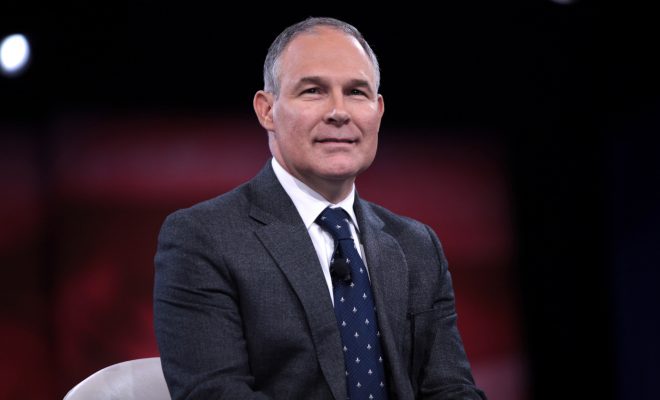 "Scott Pruitt" Courtesy of Gage Skidmore; License: (CC BY-SA 2.0)
"Scott Pruitt" Courtesy of Gage Skidmore; License: (CC BY-SA 2.0)
Energy and Environment
Can Scott Pruitt Unravel the EPA’s Endangerment Finding?
Bucking scientific consensus in the U.S. and around the world, Scott Pruitt on Thursday questioned the belief that carbon dioxide is a “primary contributor” to climate change. Pruitt, the head of the Environmental Protection Agency (EPA), will soon be rolling back many of President Barack Obama’s environmental regulations, perhaps as early as next week. And now, as Pruitt publicly undermines the widely accepted dangers of carbon dioxide, some worry that he will launch an attack against the EPA’s rule that the agency is obligated to regulate carbon dioxide and other greenhouse gases, also known as an “endangerment finding.”
In 2009, the EPA issued this endangerment finding, which concluded that carbon dioxide, along with other greenhouse gases, is a threat to “the public health and welfare of current and future generations.” The agency reviewed thousands of published studies, poring over findings from the U.S. Climate Change Science Program, the U.S. Global Change Research Program, and the Intergovernmental Panel on Climate Change, among others.
Pruitt, in an interview with CNBC, undermined his own agency’s previous conclusions. “I think that measuring with precision human activity on the climate is something very challenging to do and there’s tremendous disagreement about the degree of impact, so, no, I would not agree that it’s a primary contributor to the global warming that we see,” he said, referring to the impact carbon dioxide has on global warming.
Under section 202(a) of the Clean Air Act, the EPA stipulated that it was a duty of the agency to regulate carbon dioxide emissions. The American Chemistry Council and other groups appealed the findings to a federal circuit court in D.C. In June 2012, the court upheld the EPA’s decision. Soon after, the Supreme Court declined to hear the case, and the endangerment finding has stood its ground ever since.
That is, until President Donald Trump chose Pruitt–a longtime ally of the oil and gas industry and a determined opponent of environmental regulations–to lead the EPA. In his Senate hearing in January, Pruitt was asked if he would consider revisiting the endangerment finding. “It is there, and it needs to be enforced and respected,” he said.
Despite Pruitt’s apparent promise to respect the EPA’s finding, its future standing is not guaranteed. For one, the energy industry has been lobbying the Trump Administration to construct a legal case against the endangerment finding. Pruitt, or anyone else in the administration, does not have the unilateral authority to unravel the endangerment finding, because it was upheld in court.
If Pruitt decides to heed the calls of energy lobbyists, and balk the international scientific consensus, he would need to build a science-based legal challenge to the D.C. court’s 2012 ruling. Given the body of evidence supporting the EPA’s initial finding, that carbon dioxide does indeed contribute to global warming, and is a public health threat, Pruitt would have a difficult time building a successful legal challenge. But that does not mean he won’t try.
“President Trump’s campaign commitment was to undo President Obama’s entire climate edifice,” Myron Ebell, who worked on Trump’s EPA transition team, told the New York Times. “They’re thinking through the whole thing,” he said, adding: “I do think they are looking at reopening the endangerment finding.”








Comments